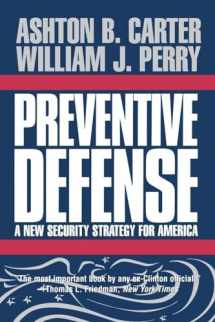
Preventive Defense: A New Security Strategy for America
Book details
Summary
Description
William J. Perry and Ashton B. Carter, two of the world's foremost defense authorities, draw on their experience as leaders of the U.S. Defense Department to propose a new American security strategy for the twenty-first century. After a century in which aggression had to be defeated in two world wars and then deterred through a prolonged cold war, the authors argue for a strategy centered on prevention. Now that the cold war is over, it is necessary to rethink the risks to U.S. security. The A list--threats to U.S. survival--is empty today. The B list--the two major regional contingencies in the Persian Gulf and on the Korean peninsula that dominate Pentagon planning and budgeting--pose imminent threats to U.S. interests but not to survival. And the C list--such headline-grabbing places as Kosovo, Bosnia, Somalia, Rwanda, and Haiti--includes important contingencies that indirectly affect U.S. security but do not directly threaten U.S. interests. Thus the United States is enjoying a period of unprecedented peace and influence; but foreign policy and defense leaders cannot afford to be complacent. The authors' preventive defense strategy concentrates on the dangers that, if mismanaged, have the potential to grow into true A-list threats to U.S. survival in the next century. These include Weimar Russia: failure to establish a self-respecting place for the new Russia in the post-cold war world, allowing it to descend into chaos, isolation, and aggression as Germany did after World War I; Loose Nukes: failure to reduce and secure the deadly legacy of the cold war--nuclear, chemical, and biological weapons in Russia and the rest of the former Soviet Union; A Rising China Turned Hostile: failure to shape China's rise to Asian superpower status so that it emerges as a partner rather than an adversary; Proliferation: spread of weapons of mass destruction; and Catastrophic Terrorism: increase in the scope and intensity of transnational terrorism.They also argue for better management of the defense establishment so the United States will retain a strong military prepared to cope with all contingencies, deter aggressors, and win a conflict if deterrence fails.


We would LOVE it if you could help us and other readers by reviewing the book
Book review



